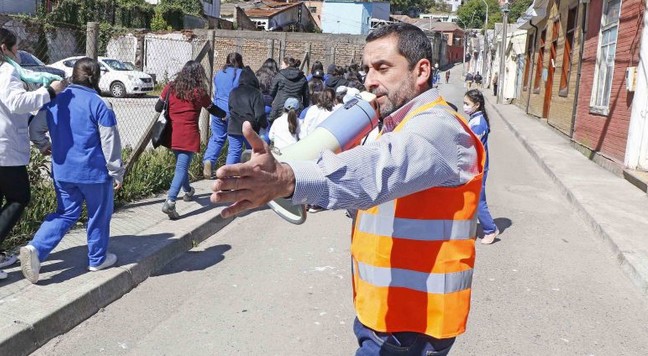- During the Cogrid session for the approval of the Regional Plan on the matter, it was established that there are still communes that have not begun the process of updating their roadmaps for potential disasters.
In the recent session of the Disaster Risk Management Committee (Cogrid) of the Biobío Region, the Regional Emergency Plan was unanimously approved, a document that took a year to prepare.
The previous version, approved since 2021, was available and was modified based on new formats, methodologies, and scenario updates.
In the context of this meeting, the need to expedite municipalities lagging in submitting their Emergency and Disaster Risk Reduction Plans to the National Disaster Prevention and Response Service (Senapred) was also raised.
The regional director of Senapred, Alejandro Sandoval, stated that it will soon be published. "We discussed the process we are updating, our risk reduction plan, which is the roadmap identifying the gaps the region has to build a more resilient region and develop capacities according to the risks we face," he said.
"We take this opportunity to inform the entire community that on September 6 at 12:00 p.m., a drill for the eruption of the Callaqui volcano will be conducted in the communes of Alto Biobío and Santa Bárbara," Sandoval stated, adding that evacuation maps will be available on Senapred's website.
During the presentation to Cogrid members on the progress of risk management instruments in various communes, it was confirmed which communes have completed their process and have both emergency and disaster risk reduction plans approved according to Senapred's methodology.
"Our goal is to continue urging all communes to comply with legal requirements regarding their current risk management instruments, in line with regulations, which ultimately translates to being better prepared to face emergency situations," Sandoval affirmed.
In progress
Some communes are working with a consultant and are contractually obligated to submit their plans, others have not yet started but already have funding to begin. However, nine communes have not submitted their emergency plans, and six disaster risk reduction plans are still missing.
However, the Senapred director clarified that all communes have active plans but require updates and new evaluation processes.
It should be noted that the regulation promoting these instruments is outlined in Law No. 21.364, whose transitional articles set a two-year deadline from its publication on August 7, 2021—meaning they should have been submitted by 2023.
The emergency plan, which should be reviewed every two years, identifies risks and summarizes the commune's capacities. The disaster risk reduction plan, a separate document, outlines strategic actions—one focused on mitigation and preparation, the other on response and recovery, explained the regional director of Senapred, adding that the latter undergoes review every five years.
The Presidential Delegate of the Biobío Region, Daniela Dresdner, stated, "I want to send a clear message: it is important for regional and communal plans to work together. Some communes have done great work in submitting their plans (...) others are lagging. All of us in the Biobío Region must catch up to build a strong institution ready for emergencies."
"Resources have been made available, and we know municipalities have varying capacities, which is why we’ve asked liaison seremis to review progress with the most delayed municipalities to move forward," the delegate added.
Regarding potential financial support for lagging municipalities, Óscar Ferrel, head of the Infrastructure and Transport Division of the Biobío Regional Government, noted, "The Gore is the last resort because we prioritize swift action, but the Regional Government’s funding cycle is somewhat lengthy."
"This is a legal obligation; we will make mayors aware (...) I believe this is not a funding issue but a management one, so we must keep addressing these shortcomings," he commented.
On the progress of the regional plan and municipalities that have submitted their plans, Ferrel added, "We must acknowledge the well-executed work that is gradually closing gaps."
Source:diarioconcepcion.cl







Comentarios (0)
No hay comentarios aún. ¡Sé el primero en comentar!
Deja un comentario